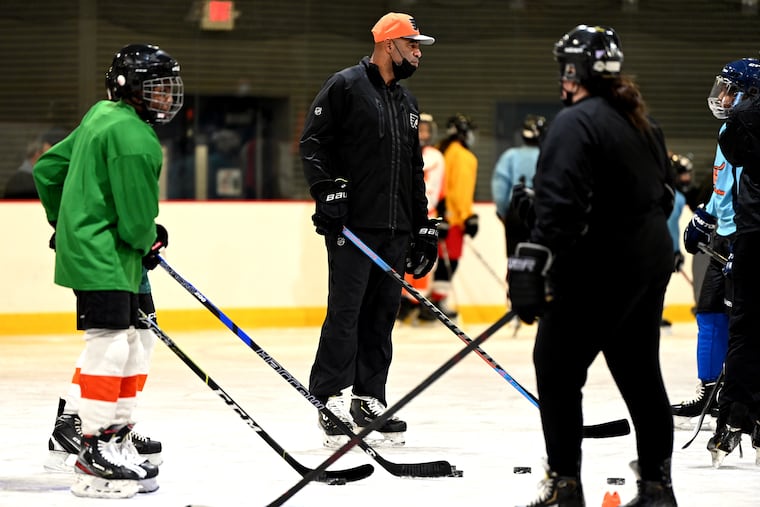Former Flyer Donald Brashear hopes he can be a role model for kids and through hockey ‘help them stay out of trouble’
Brashear, 49, participated in a clinic Wednesday in Philly for kids from the Ed Snider Youth Hockey Foundation.

Donald Brashear, a former Flyers enforcer who spent 16 fight-filled seasons in the NHL and played more than 1,000 games, has endured a troubled childhood and bouts with drug abuse.
Hockey helped him overcome the former problem. Rehab helped him win “a hard battle” with the latter.
Known to friends as ”Brash,” the former left winger who played for the Flyers from 2001-06 recently played in the Flyers alumni game at the Wells Fargo Center. He volunteered to stay behind a couple of extra days and did a hockey clinic and question-and-answer session for 50-60 boys and girls ages 11-15, members of the Ed Snider Youth Hockey Foundation on Wednesday.
» READ MORE: Gallery from Wednesday's Ed Snider Youth Hockey Foundation clinic
“I like to give back,” Brashear, 49, said last week from his home in Quebec City, near where he fell in love with hockey and found a release at the rink when he was a youngster.
The clinic was held at the Laura Sims Skate House in West Philadelphia. Brashear, who helped launch the Snider Foundation in 2005, said it’s a way for him to give that predominantly Black community a Black hockey role model. Nearly 70% of the clinic’s participants will be African American, said a spokesman for the group.
Brashear survived a childhood in which he was a victim of mental and physical abuse. He spent time in several foster homes, and said that since he overcame obstacles and made it to the NHL, he wants to show youngsters “it’s possible” for them to do so, too.
“You don’t see as many pro Black hockey players,” he said. “I guess they have the tendency to think that maybe it’s not a sport for us. When I was a kid, I first thought I was going to play basketball or football or baseball. They were sports for Black players, if you know what I mean. I thought hockey was a sport for white people, but that changed along the way.”
Brashear believes working with the next generation is important.
“It’s good for me to give back to the kids; everybody needs help,” said Brashear, who was born in Indiana and moved near Quebec City when he was about 4. “I had to fight through some tough stuff in life, so I know you always need help at some point.”
Brashear struggled with cocaine use (and other drugs) and went through several rehab programs, some covered by the NHL Players’ Emergency Assistance Fund. He said he has been clean for a while. “I don’t count how long [it’s been]. I’m doing really good now,” he said. “It was a hard battle, but I came through. And by helping out kids in hockey, maybe I can help them stay out of trouble. Getting them interested in something is my way of giving back.”
Brashear, one of the most feared NHL players of his time and a man who racked up 2,634 career penalty minutes (15th all-time), said his battle against drugs “is always there, and it’s a constant fight, but obviously when life is better, it’s much easier.”
Like Brashear, former Flyers right winger Wayne Simmonds has been a huge supporter of the foundation, Ed Snider Youth Hockey Foundation, and since he was traded in 2019, he has continued assisting the youngsters, said Scott Tharp, the foundation president.
“He was on our board when he was here, but obviously it’s impossible for him now to attend meetings,” Tharp said. “But since he was traded, he has come back and done things for us when we’ve asked. He’s still behind our mission and is one of those guys who makes himself available whenever he can. He’s really behind all the ‘Hockey is for Everyone’ initiatives and trying to give kids the opportunity who wouldn’t otherwise have a chance to play hockey.”
» READ MORE: Veteran Derick Brassard has helped the Flyers fill a Kevin Hayes-sized void in the lineup